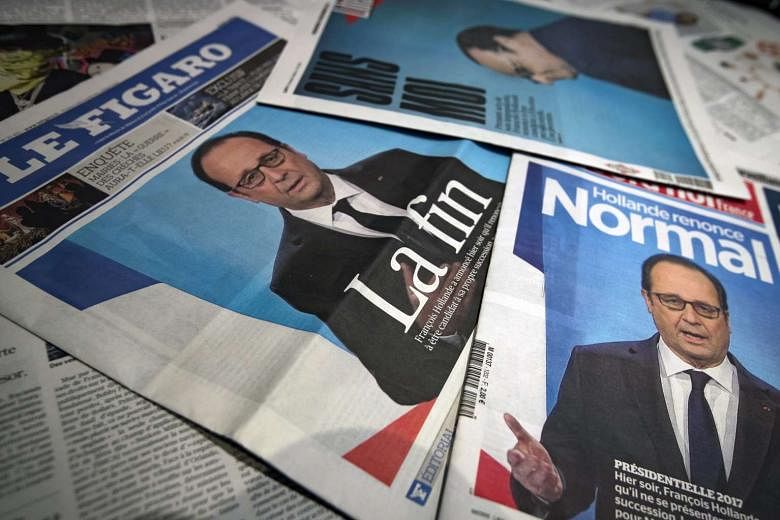PARIS (REUTERS) - It was nine minutes into his speech on Thursday (Dec 1) evening that Francois Hollande dropped the bombshell that only a few members of his inner circle knew was coming. He would not, after all, seek a second term as president of France.
Confounding most expectations, he was acknowledging that to stand would be bad for his Socialist party's already slim chances of victory next year.
Sources close to Hollande told Reuters that only a tiny handful of people knew of his decision, and they learned by telephone just hours before he went before the television cameras.
According to a close friend, lawyer Pierre Mignard, opposition from his children and their mother, the energy minister Segolene Royal, might have helped tip him over the edge.
"Segolene Royal had let it be known publicly that she wasn't in favour. Nor were his children. All that played a part," he was reported as saying in Friday's Le Parisien newspaper.
Prime Minister Manuel Valls, seen as likely to take Hollande's place as the Socialist party candidate, was among those telephoned, and the pair also spoke after the president's address.
"At that moment, we left the office, so that they could be alone together," said one member of Hollande's team. The head of state later dined with his family.
President since 2012, trouble set in early for Hollande.
He came to power on a left-wing, anti-financial sector platform that failed to bring centrists into his government, but ended up introducing business-friendly labour reforms that annoyed the left.
His policies failed to make a dent in stubbornly high unemployment, and while his statesmanlike qualities came to the fore after the first of a series of Islamist militant attacks in early 2015, the effect faded fast as more came along.
By this year, he was the least popular president in modern French history, scoring just four percent in one poll.
The publication in October of a book of interviews with him upset many in France and led to opposition calls for his impeachment over security revelations, and criticism from some of his closest supporters.
By then, he was already facing a stark choice: Take part in January's Socialist primaries and risk a humiliating defeat, avoid the primaries and further splinter an already divided left, or drop out altogether.
Opinion polls show him or any other Socialist candidate in single figures in next April's first round of the presidential election, from where the top two candidates go through to a run-off.
On Sunday, the election of the right-leaning Francois Fillon as the main centre-right candidate over his more centrist rival Alain Juppe may have offered the 62-year-old president a glimmer of hope that he could put together a left-and-centre coalition to face Fillon and the other main contender, Marine Le Pen of the far-right National Front.
But on the same day, Valls gave a newspaper interview criticising his boss openly over the book episode and making clear he was ready to stand in his place. "This very honourable exit will help rehabilitate his term,"said Mignard. "I think that in the last six months that are left he will be a very popular president."

